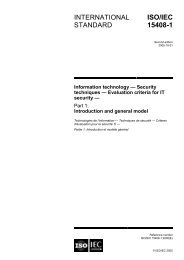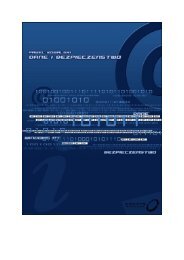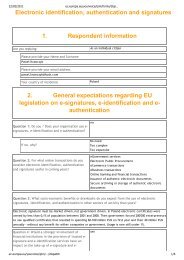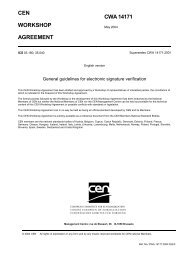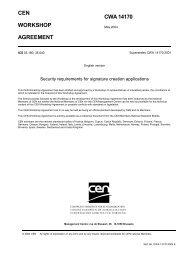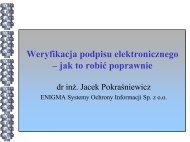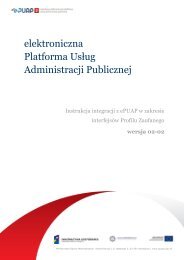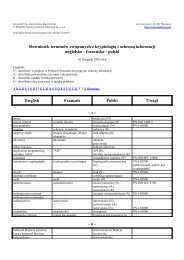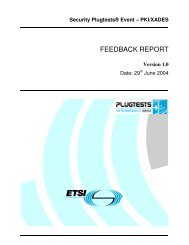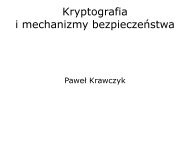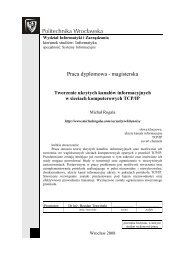When electronic signature becomes a information services ... - IPSec
When electronic signature becomes a information services ... - IPSec
When electronic signature becomes a information services ... - IPSec
Create successful ePaper yourself
Turn your PDF publications into a flip-book with our unique Google optimized e-Paper software.
with the QES effectively prevents the development of <strong>electronic</strong> <strong>services</strong>, instead of helping to<br />
develop them. This is because each administration has large number of processes that vary in<br />
requirements for the level of security assurance associated with the QES. Defining a single<br />
security function covering all of the processes an organisation might want, means that the<br />
security level needs to be adjusted for the most demanding process. But the ‘one size fits all’<br />
approach means that excess security is not for free. In particular, the costs of security for the<br />
end use are notoriously ignored. Some Member States in the EU understood this. E-government<br />
<strong>services</strong> were begun, such as revenue service declarations, without a QES. The government<br />
gateway in the United Kingdom started around 2001 with login and password, and new security<br />
features have been introduced for users to take up is they wish to.<br />
On the other hand, a large number of trivial informative processes (such as the issuing of<br />
declarations and certificates) were effectively blocked in Poland by the strategic decision taken<br />
in 2001 that a QES was the only method that was permitted to establish trust between the<br />
citizen and the government. Buying a qualified certificate at a cost of US$100 to request or<br />
send a simple declaration made no economic sense for most citizens, but the administration was<br />
not permitted to use simpler methods, even if they were considered to be adequate for the<br />
purpose. 39 The inability to admit this simple fact resulted in the waste of public money on an<br />
unbelievable scale. By 2008, most public administration units in Poland were required to buy or<br />
outsource an Internet document gateway (ESP) 40 that only allowed communications with the<br />
use of a QES. The market for qualified certificates was such that only 0.01 per cent of the<br />
population acquired a qualified certificate, and there was little economic sense for citizens to<br />
buy any more, which meant that the administration spent millions of euros for systems that<br />
were virtually never used. An ESP gateway in Krakow (population of 750,000) reported in<br />
2009 that around five <strong>electronic</strong>ally signed documents were being submitted annually since it<br />
was installed. 41<br />
39<br />
The requirement to use a QES was one of the factors that prevented most citizens interacting with the otherwise highly useful<br />
SEKAP portal in the Silesia district.<br />
40<br />
Elektroniczna Skrzynka Podawcza (ESP), literally ‘<strong>electronic</strong> lodgement of documents office’. This was introduced by<br />
Rozporządzenie Prezesa Rady Ministrów z dnia 29 września 2005 w sprawie warunków organizacyjno-technicznych doręczania dokumentów<br />
elektronicznych podmiotom publicznym.<br />
41<br />
Katarzyna Ponikowska, ‘Podpiszesz bez długopisu’, 30 November 2009, Echo Miasta Krakowa, available at<br />
http://wiadomosci.onet.pl/2681,2087146,podpiszesz_bez_dlugopisu,wydarzenie_lokalne.html. Estimating the cost of such an ESP at around<br />
15-25 thousand euros, the return on investment would produce a large, negative number. Another way of assessing the economical efficiency<br />
would be by dividing cost of the ESP by the number of documents processed. Both estimates suggest that the example cannot be seen other<br />
than as a shocking waste of public money as result of the implementation of flawed legislation.



